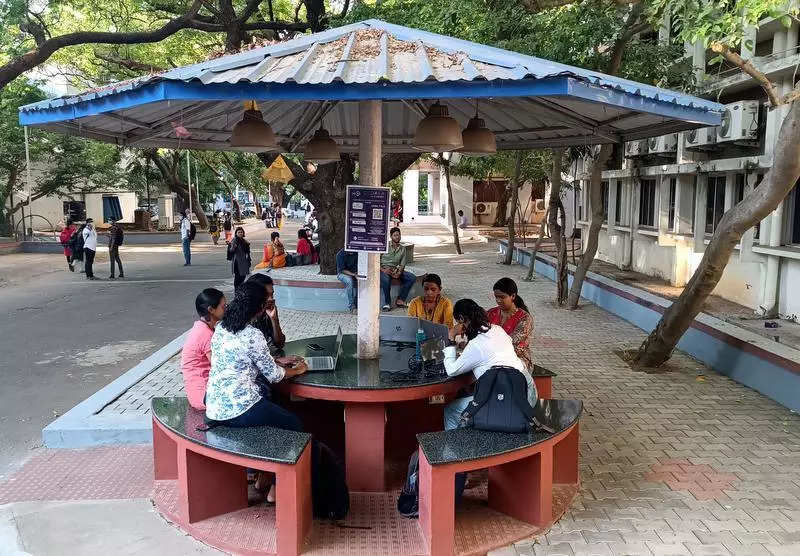Colleges prep harder to place better | Chennai News – The Times of India

Chennai: After a two-year lull, placement season has picked up this time around, with major IT companies returning to campus. But, with changing global scenarios, colleges are not resting. They’ve already started drumming up new strategies to secure many more offers next season.
From appointing student ambassadors who would directly talk to recruiters to keeping labs open for longer hours, campuses — big and small — are pulling out all the stops.
Here’s a round-up of some of the strategies:
For the students, by the students
Taking a leaf out of IIT’s playbook, Anna University plans to train bright and interested third-year students as ambassadors. The students shall directly meet with people from relevant industries and show them presentations about their batch, their skill sets and domain knowledge.
“Students should be part of the entire placement process. Then, they would get an idea about what skills they might need and what the industry is looking for,” said K Shanmuga Sundaram, director, Centre for University-Industry Collaboration (CUIC), Anna University.
The appointments will be set up by CUIC, and students shall start working on their presentations during summer holidays. Professors hope that this will increase a student’s negotiation and problem-solving skills.
“We hope that students’ presentations will convince more industries about the talent pool available within our campuses. It may increase the placements,” he added.
Mock interviews (featuring AI)
VIT, on the other hand, is using artificial intelligence to conduct mock interviews, which used to be done by faculty members.
Students shall speak to a bot and answer its questions — some of which will be taken from blogs of students who have already attended the interviews.
“The bot will present an individual report for each student after the interview. It will give feedback on their body language, communication skills, and responses. It will give suggestions on materials and resources a student might need to prepare,” said V Samuel Rajkumar, director, Career Development Centre, VIT.
VIT has also introduced psychometric assessment, which is used by companies to assess a candidate’s suitability for a role based on personality and aptitude. And, colleges have started inviting employed students to talk about their interview experiences. There will also be a quiz for third-year students based on that.
Let’s keep the labs open
Some engineering colleges, located outside the cities, used to close their labs by 3pm or 4pm. Not anymore. With more students working on real-time projects, participating in hackathons, and taking industry-relevant courses, labs are now kept open for at least until 10pm.
“We are keeping our campus open for 12 hours. Our labs are open with necessary security arrangements until 10pm or 11pm,” said Abhay Meganathan, vice-chairman, Rajalakshmi Group of Institutions. “It will help students get hands-on training, and allow them to to work on real-time projects. This is not possible in the regular curriculum,” he said. Colleges are also planning to come up with more facilities, such as gyms, to keep students engaged.
Small groups, many domains
Instead of holding common training sessions, colleges have started to train students in different domains, as companies come to campuses with multiple skill requirements. “The placement training in campuses has undergone a huge change in the past two years. Students are acquiring skills based on their domains, including generative AI, data science, fintech, chip design, and full-stack development,” said P Deiva Sundari, principal of SRM Easwari Engineering College. She said companies are ready to offer pay packages higher than 20 lakh a year when students are exposed to industry problems.
Many colleges start training students on industry-relevant skills from the second year. They say core engineers with strong basics and problem-solving skills will be in good demand in the coming year.
Chennai: After a two-year lull, placement season has picked up this time around, with major IT companies returning to campus. But, with changing global scenarios, colleges are not resting. They’ve already started drumming up new strategies to secure as many offers next season.
From appointing student ambassadors who would directly talk to recruiters to keeping labs open for longer hours, campuses — big and small — are pulling out all the stops.
Here’s a round-up of some of the strategies:
For the students, by the students
Taking a leaf out of IIT’s playbook, Anna University plans to train bright and interested third-year students as ambassadors. The students shall directly meet with people from relevant industries and show them presentations about their batch, their skill sets and domain knowledge.
“Students should be part of the entire placement process. Then, they would get an idea about what skills they might need and what the industry is looking for,” said K Shanmuga Sundaram, director, Centre for University-Industry Collaboration (CUIC), Anna University.
The appointments will be set up by CUIC, and students shall start working on their presentations during summer holidays. Professors hope that this will increase a student’s negotiation and problem-solving skills.
“We hope that students’ presentations will convince more industries about the talent pool available within our campuses. It may increase the placements,” he added.
Mock interviews (featuring AI)
VIT, on the other hand, is using artificial intelligence to conduct mock interviews, which used to be done by faculty members.
Students shall speak to a bot and answer its questions — some of which will be taken from blogs of students who have already attended the interviews.
“The bot will present an individual report for each student after the interview. It will give feedback on their body language, communication skills, and responses. It will give suggestions on materials and resources a student might need to prepare,” said V Samuel Rajkumar, director, Career Development Centre, VIT.
VIT has also introduced psychometric assessment, which is used by companies to assess a candidate’s suitability for a role based on personality and aptitude. And, colleges have started inviting employed students to talk about their interview experiences. There will also be a quiz for third-year students based on that.
Let’s keep the labs open
Some engineering colleges, located outside the cities, used to close their labs by 3pm or 4pm. Not anymore. With more students working on real-time projects, participating in hackathons, and taking industry-relevant courses, labs are now kept open for at least until 10pm.
“We are keeping our campus open for 12 hours. Our labs are open with necessary security arrangements until 10pm or 11pm,” said Abhay Meganathan, vice-chairman, Rajalakshmi Group of Institutions. “It will help students get hands-on training, and allow them to to work on real-time projects. This is not possible in the regular curriculum,” he said. Colleges are also planning to come up with more facilities, such as gyms, to keep students engaged.
Small groups, many domains
Instead of holding common training sessions, colleges have started to train students in different domains, as companies come to campuses with multiple skill requirements. “The placement training in campuses has undergone a huge change in the past two years. Students are acquiring skills based on their domains, including generative AI, data science, fintech, chip design, and full-stack development,” said P Deiva Sundari, principal of SRM Easwari Engineering College. She said companies are ready to offer pay packages higher than 20 lakh a year when students are exposed to industry problems.
Many colleges start training students on industry-relevant skills from the second year. They say core engineers with strong basics and problem-solving skills will be in good demand in the coming year.
From appointing student ambassadors who would directly talk to recruiters to keeping labs open for longer hours, campuses — big and small — are pulling out all the stops.
Here’s a round-up of some of the strategies:
For the students, by the students
Taking a leaf out of IIT’s playbook, Anna University plans to train bright and interested third-year students as ambassadors. The students shall directly meet with people from relevant industries and show them presentations about their batch, their skill sets and domain knowledge.
“Students should be part of the entire placement process. Then, they would get an idea about what skills they might need and what the industry is looking for,” said K Shanmuga Sundaram, director, Centre for University-Industry Collaboration (CUIC), Anna University.
The appointments will be set up by CUIC, and students shall start working on their presentations during summer holidays. Professors hope that this will increase a student’s negotiation and problem-solving skills.
“We hope that students’ presentations will convince more industries about the talent pool available within our campuses. It may increase the placements,” he added.
Mock interviews (featuring AI)
VIT, on the other hand, is using artificial intelligence to conduct mock interviews, which used to be done by faculty members.
Students shall speak to a bot and answer its questions — some of which will be taken from blogs of students who have already attended the interviews.
“The bot will present an individual report for each student after the interview. It will give feedback on their body language, communication skills, and responses. It will give suggestions on materials and resources a student might need to prepare,” said V Samuel Rajkumar, director, Career Development Centre, VIT.
VIT has also introduced psychometric assessment, which is used by companies to assess a candidate’s suitability for a role based on personality and aptitude. And, colleges have started inviting employed students to talk about their interview experiences. There will also be a quiz for third-year students based on that.
Let’s keep the labs open
Some engineering colleges, located outside the cities, used to close their labs by 3pm or 4pm. Not anymore. With more students working on real-time projects, participating in hackathons, and taking industry-relevant courses, labs are now kept open for at least until 10pm.
“We are keeping our campus open for 12 hours. Our labs are open with necessary security arrangements until 10pm or 11pm,” said Abhay Meganathan, vice-chairman, Rajalakshmi Group of Institutions. “It will help students get hands-on training, and allow them to to work on real-time projects. This is not possible in the regular curriculum,” he said. Colleges are also planning to come up with more facilities, such as gyms, to keep students engaged.
Small groups, many domains
Instead of holding common training sessions, colleges have started to train students in different domains, as companies come to campuses with multiple skill requirements. “The placement training in campuses has undergone a huge change in the past two years. Students are acquiring skills based on their domains, including generative AI, data science, fintech, chip design, and full-stack development,” said P Deiva Sundari, principal of SRM Easwari Engineering College. She said companies are ready to offer pay packages higher than 20 lakh a year when students are exposed to industry problems.
Many colleges start training students on industry-relevant skills from the second year. They say core engineers with strong basics and problem-solving skills will be in good demand in the coming year.
Chennai: After a two-year lull, placement season has picked up this time around, with major IT companies returning to campus. But, with changing global scenarios, colleges are not resting. They’ve already started drumming up new strategies to secure as many offers next season.
From appointing student ambassadors who would directly talk to recruiters to keeping labs open for longer hours, campuses — big and small — are pulling out all the stops.
Here’s a round-up of some of the strategies:
For the students, by the students
Taking a leaf out of IIT’s playbook, Anna University plans to train bright and interested third-year students as ambassadors. The students shall directly meet with people from relevant industries and show them presentations about their batch, their skill sets and domain knowledge.
“Students should be part of the entire placement process. Then, they would get an idea about what skills they might need and what the industry is looking for,” said K Shanmuga Sundaram, director, Centre for University-Industry Collaboration (CUIC), Anna University.
The appointments will be set up by CUIC, and students shall start working on their presentations during summer holidays. Professors hope that this will increase a student’s negotiation and problem-solving skills.
“We hope that students’ presentations will convince more industries about the talent pool available within our campuses. It may increase the placements,” he added.
Mock interviews (featuring AI)
VIT, on the other hand, is using artificial intelligence to conduct mock interviews, which used to be done by faculty members.
Students shall speak to a bot and answer its questions — some of which will be taken from blogs of students who have already attended the interviews.
“The bot will present an individual report for each student after the interview. It will give feedback on their body language, communication skills, and responses. It will give suggestions on materials and resources a student might need to prepare,” said V Samuel Rajkumar, director, Career Development Centre, VIT.
VIT has also introduced psychometric assessment, which is used by companies to assess a candidate’s suitability for a role based on personality and aptitude. And, colleges have started inviting employed students to talk about their interview experiences. There will also be a quiz for third-year students based on that.
Let’s keep the labs open
Some engineering colleges, located outside the cities, used to close their labs by 3pm or 4pm. Not anymore. With more students working on real-time projects, participating in hackathons, and taking industry-relevant courses, labs are now kept open for at least until 10pm.
“We are keeping our campus open for 12 hours. Our labs are open with necessary security arrangements until 10pm or 11pm,” said Abhay Meganathan, vice-chairman, Rajalakshmi Group of Institutions. “It will help students get hands-on training, and allow them to to work on real-time projects. This is not possible in the regular curriculum,” he said. Colleges are also planning to come up with more facilities, such as gyms, to keep students engaged.
Small groups, many domains
Instead of holding common training sessions, colleges have started to train students in different domains, as companies come to campuses with multiple skill requirements. “The placement training in campuses has undergone a huge change in the past two years. Students are acquiring skills based on their domains, including generative AI, data science, fintech, chip design, and full-stack development,” said P Deiva Sundari, principal of SRM Easwari Engineering College. She said companies are ready to offer pay packages higher than 20 lakh a year when students are exposed to industry problems.
Many colleges start training students on industry-relevant skills from the second year. They say core engineers with strong basics and problem-solving skills will be in good demand in the coming year.
















